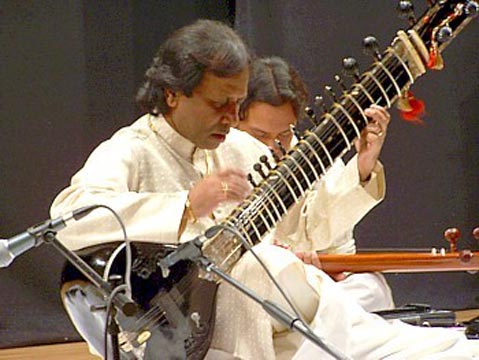Indian Improv and Other Delights
Amjad Ali Khan Comes to UCSB

HINDUSTANI HIGHS: Despite the currently woozy tailspin of the recorded-music industry, as we have known it, never in history have we had such easy access to all manner of sounds, thanks to the Internet. Even so, that very ’net-ready bounty — conversely and perhaps perversely — continually reminds us that most of the music worth hearing is worth hearing the old-school way — live, in a room with other people, people with open ears, brains, and hearts. That self-evident truism is especially valid for music in which improvisation is a key ingredient. What happens in a venue hosting improvised music stays in that venue, in its purest, most real-time state.
Jazz is America’s greatest example of the improvisational imperative. From more ancient, global sources, Indian classical music is another. We tasted the sure, subtle power and profound spontaneity of Indian classical tradition recently at UCSB’s Girvetz Hall, when Indian organization Raagmala hosted a concert blending Hindustani and Carnatic/North and South musical dialects, via bedazzlers sitarist Shahid Parvez and flutist Shashank, with percussionists in tow. Part of this memorable concert’s appeal, aside from the musical fabric as it unfolded there and then, related to the expanded spectrum of public access to the world of Indian classical music. While a handful of renowned Indian musicians, including Ravi and now Anoushka Shankar and Zakir Hussain, seize the public spotlight, other major Indian musicians have yet to be widely heard.
That trend continues with the Santa Barbara debut of renowned sarod player Amjad Ali Khan Saturday, May 29, at UCSB’s MultiCultural Center (MCC), bringing the MCC’s current series to a grand finale. The sarod is a decidedly less well-known instrument than the sitar, its best known proponent stateside being Marin County-based sarod master Ali Akbar Khan. But Amjad Ali Khan has done much to expand the instrument’s usage, both in Hindustani and crossover contexts, along with his sons, Amaan and Ayaan, also performing on Saturday. It’s a real, real-time calendar marker.
CELLIST HITHER AND YON, SERIOUSLY ROCKING: Maya Beiser knows well the delicate blend of expansiveness and intimacy, of asserting a generous presence under lean circumstances. The N.Y.C.-based new-music cellist came out west recently, to play the Atwater Village Theatre in L.A. to promote the release of her luminous and hip new album, Provenance. There she was, a lovely woman in a shimmering black outfit in the compacted ambience of this black-box theater, playing solo, but not solo — at the vortex of sonic effects and digital ghost collaborators.
Beiser’s electronic enhancement was fully engaged for the delicious maze of Steve Reich’s “Cello Counterpoint,” from a series of Reich’s soloist-in-a-prerecorded-house-of-mirrors pieces, including pieces for clarinetist Richard Stoltzman and guitarist Pat Metheny. Beiser is a ripe “Counterpoint” candidate, given her ease and flexibility in electro-acoustic-techno machinations. From a distinctly different corner, stylistically and culturally, she summoned the mournful luster of Armenian composer and “duduk” master Djivan Gasparyan’s “Memories,” from her new CD. Over a low drone, Beiser issued the soaring, yearning lines and eloquent melancholy Gasparyan is famous for, organically transplanted to her cello.
Cellists like Beiser, whose ears stretch from classical to rock and beyond, may be naturally attracted to Led Zeppelin’s “Kashmir,” which closed the show, and closes Provenance. This “classic rock” classic, rock and roll’s best example of three-against-four rhythmic math, has also become an evergreen in the making on the “serious” music landscape. As with the version by fellow eclectic-minded cellist Matt Haimovitz — who has played at SOhO — Beiser’s version digs into the chugging but brainy rhythms and Arabic-flavored melodic arabesques. The melody came texturally caked in rich, craggy, shifting overtones — suggesting the timbre of electric guitar distortion. At the end, she wave-layered echoing lines, ascending into the moonset.
Beiser belongs to a growing pack of classically trained musicians pushing outward from conventional aesthetics into pop and so-called “world music.” She has big ideas, delivered with a sensually direct, immediate, and personal voice. John Bonham would approve of her message.



